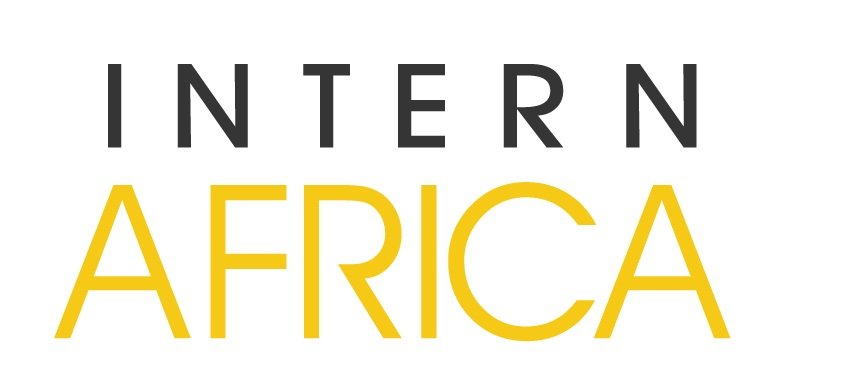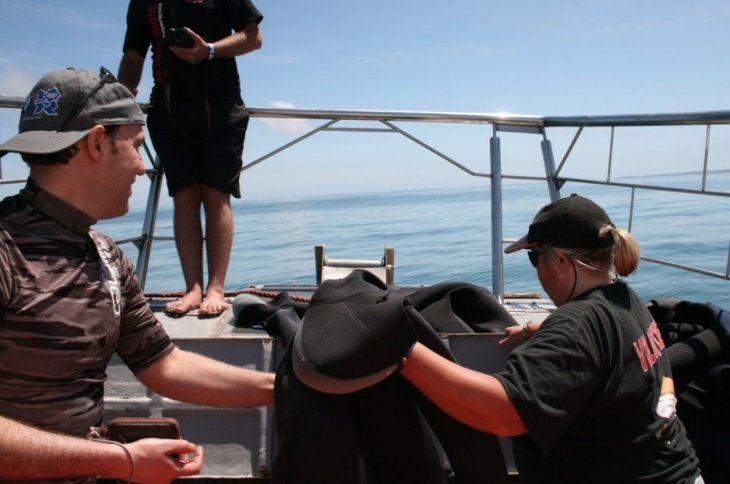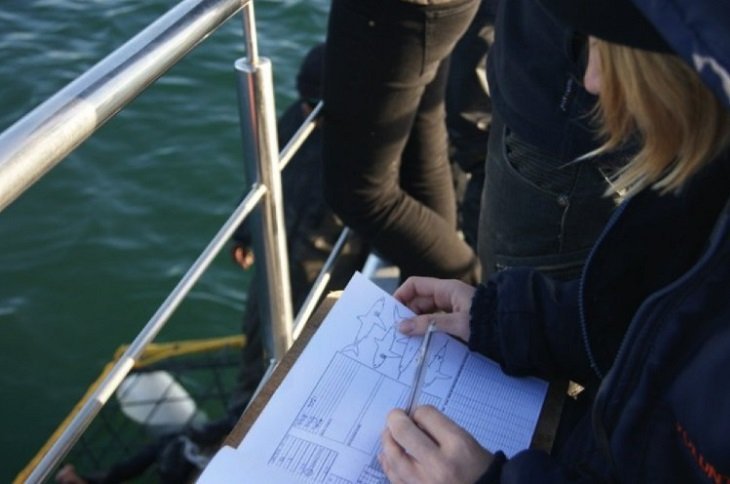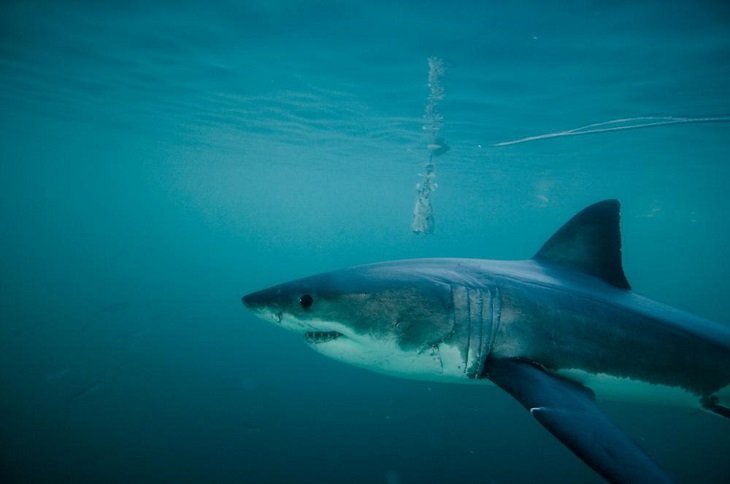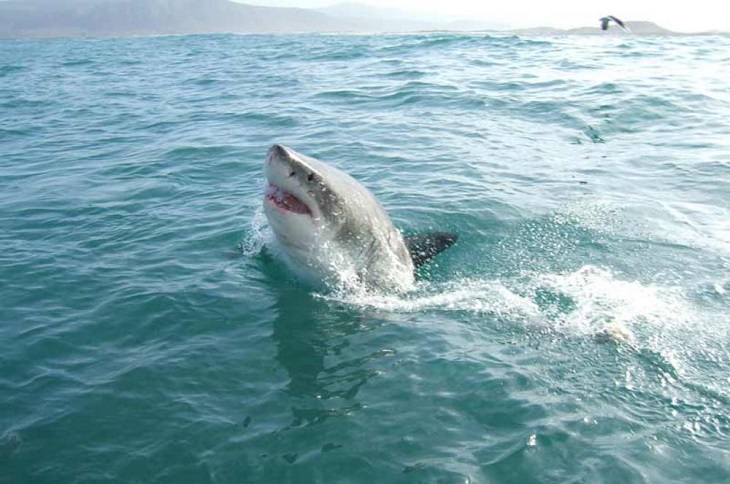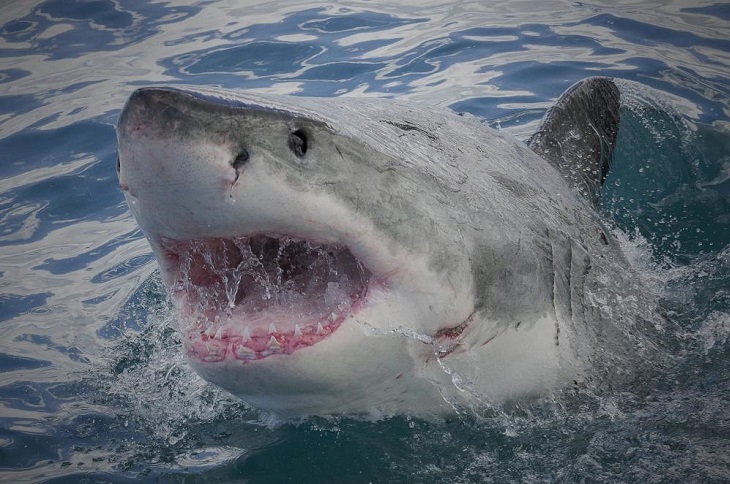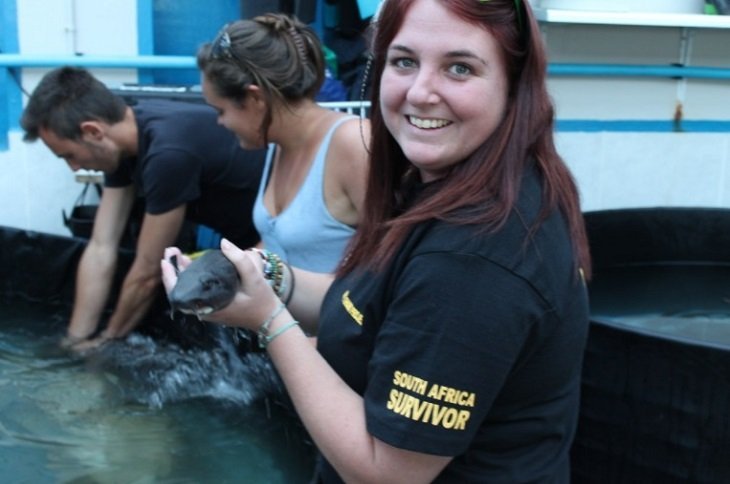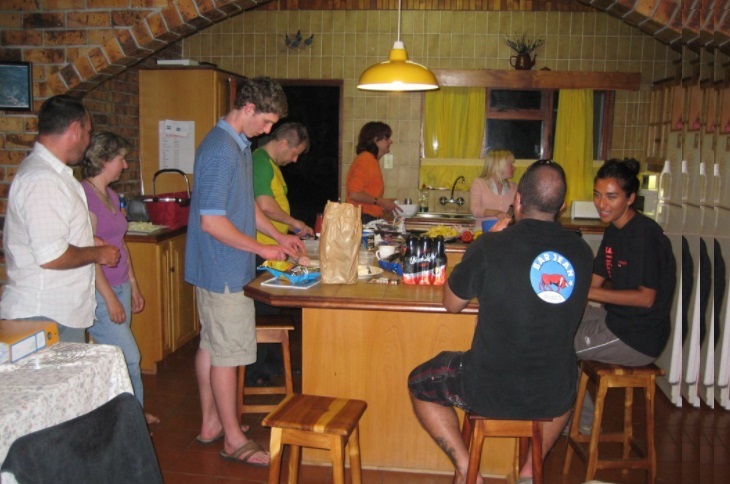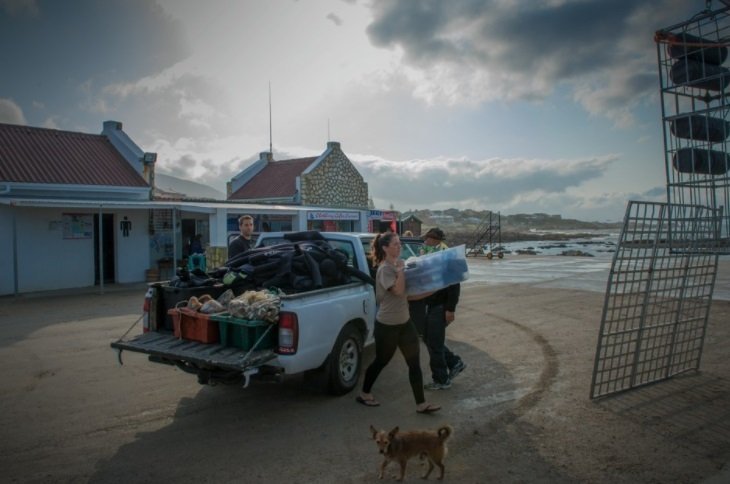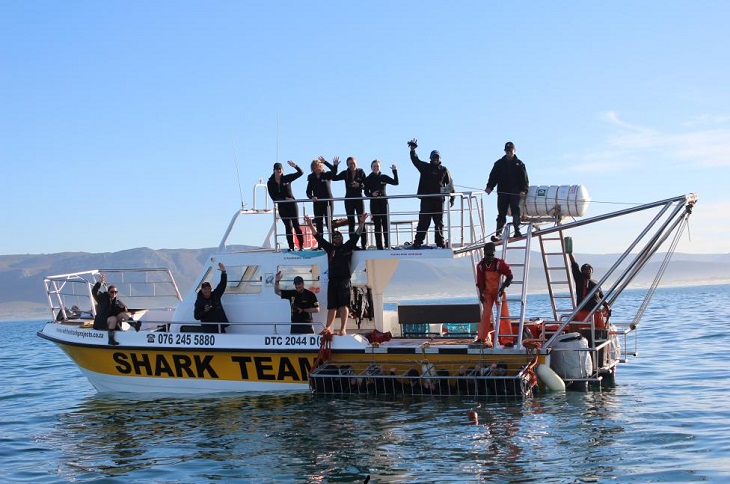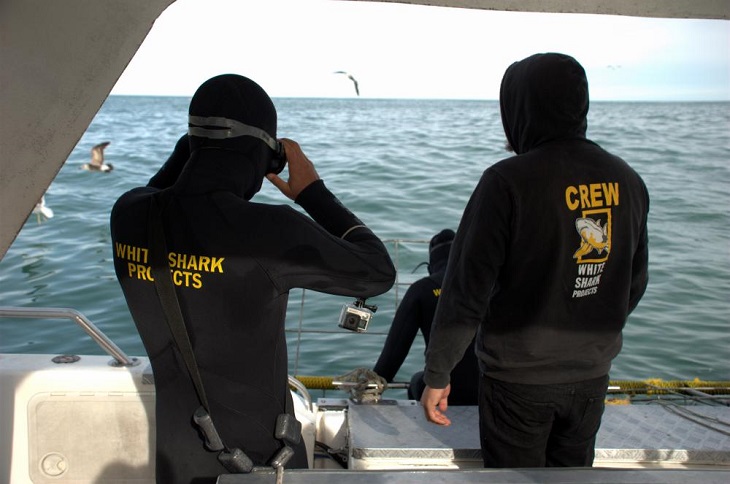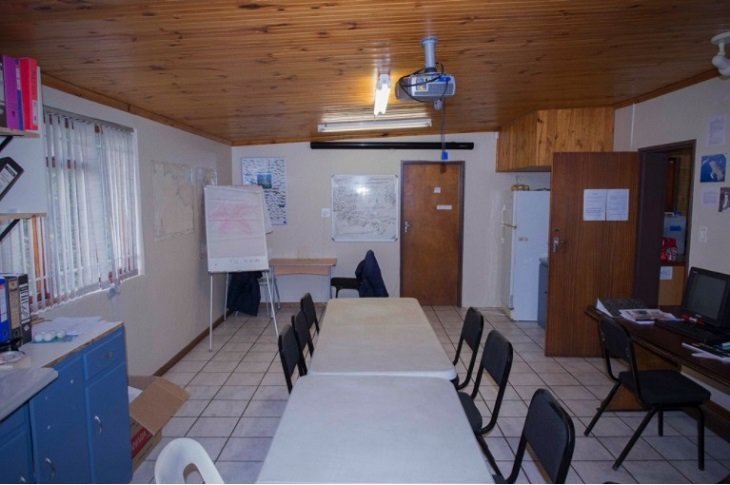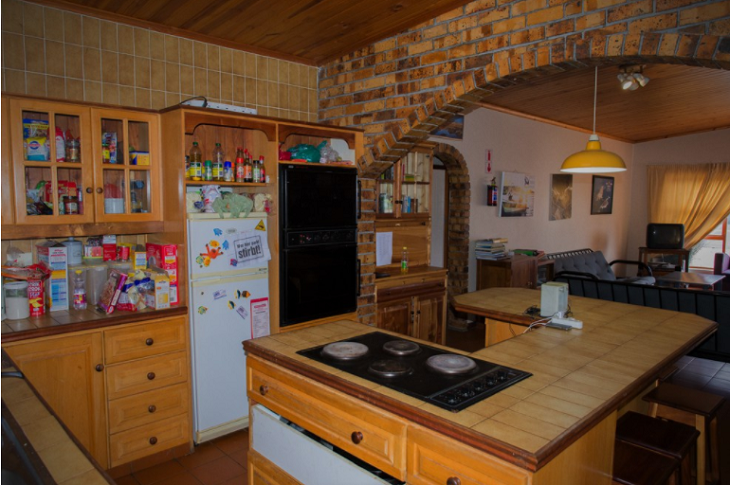This program is aimed at creating an awareness of the Great White Shark and promoting the shark and its need for protection. The program is open to any dedicated, hardworking individual with a passion and love for the great white and the ocean. You will be thought everything you will need to know.
South Africa has long been known for its abundance of Great White Sharks, making it a prime area to observe these magnificent creatures. The Great White Shark, which can grow up to seven meters (23 feet) in length and 4 tons in weight, is now a protected species in South Africa. Owing to massive negative media publicity over the years, sharks have become one of the most maligned, misunderstood, even hated species on our fragile planet. They have been pursued, hunted and indiscriminately slaughtered, to the point where many species are endangered.
Unsustainable fishing practices, dorsal fin poaching and environmental degradation compounded by a relatively slow Great White breeding cycle are all factors contributing to the potential demise of this amazing creature. The project is dedicated to the exploration and conservation of the world’s greatest predator, the Great White Shark, and its environment. The project works with predominately eco-tourists, volunteers and local enthusiasts to gather data on Great White Sharks, correct negative misconceptions about sharks, and stop the needless slaughter of over 100 million sharks annually. Current programs involve eco-tourism, public education, environmental advocacy as well as various social up-liftment programmes.
They are the world leading organisation focusing on the Great White Shark. Founded in 1989 purely as a research centre, it has grown and broadened its reach by establishing a commercial arm and funding a non-profit organisation the South African Shark Conservancy. The boat trips runs out of Kleinbaai, which is just outside of Gansbaai, South Africa – a seaside village located approximately two hours southeast of Cape Town on the Atlantic Ocean coast. The shark trips primarily take place off Dyer and Geyser Islands, about 6 nautical miles (11 km) or a 20 minute boat trip offshore. This is the location during the winter season (usually April till August). Dyer Island (larger island) is a breeding ground for the endangered African Penguins, Cape Cormorants, Gannets and many other species, while Geyser Rock (the smaller island) is a breeding ground for approximately 60,000 Cape Fur Seals. The bay is a magnet for Great White Sharks due to this breeding colony of seals, their favourite prey, and is a wonderful area for cage diving as there are reefs, islands and huge kelp beds which all provide protection from the open sea swell and wind. Please note that the cage diving location is subject to change depending on the weather conditions and location of the sharks. Kleinbaai is renowned for its sharks – and not its night life!
Finding the Great White Shark is a skill, involving years of practice - the water temperature, depth, visibility, swell height, current and wind direction are all major factors. Great White Sharks are surface feeders, so volunteers will be spellbound when seeing the Great White lift its head right out of the water to investigate, and sometimes breach completely. Divers will get to experience Great Whites from the safety of cages, while non-divers have a great opportunity to view the sharks from the safety of the boat, where exhilarating photographs and video footage may be captured at close range. There may be an opportunity to catch a glimpse of dolphins as well as magnificent southern right whales coming up from Antarctica to breed from May to November. These expeditions are more than just thrilseeking adventures, they are educational experiences.
Please note you do not have to be a diver to join the volunteer programme, all diving in the cage is a simple breath hold method.
South Africa has long been known for its abundance of Great White Sharks, making it a prime area to observe these magnificent creatures. The Great White Shark, which can grow up to seven meters (23 feet) in length and 4 tons in weight, is now a protected species in South Africa. Owing to massive negative media publicity over the years, sharks have become one of the most maligned, misunderstood, even hated species on our fragile planet. They have been pursued, hunted and indiscriminately slaughtered, to the point where many species are endangered.
Unsustainable fishing practices, dorsal fin poaching and environmental degradation compounded by a relatively slow Great White breeding cycle are all factors contributing to the potential demise of this amazing creature. The project is dedicated to the exploration and conservation of the world’s greatest predator, the Great White Shark, and its environment. The project works with predominately eco-tourists, volunteers and local enthusiasts to gather data on Great White Sharks, correct negative misconceptions about sharks, and stop the needless slaughter of over 100 million sharks annually. Current programs involve eco-tourism, public education, environmental advocacy as well as various social up-liftment programmes.
They are the world leading organisation focusing on the Great White Shark. Founded in 1989 purely as a research centre, it has grown and broadened its reach by establishing a commercial arm and funding a non-profit organisation the South African Shark Conservancy. The boat trips runs out of Kleinbaai, which is just outside of Gansbaai, South Africa – a seaside village located approximately two hours southeast of Cape Town on the Atlantic Ocean coast. The shark trips primarily take place off Dyer and Geyser Islands, about 6 nautical miles (11 km) or a 20 minute boat trip offshore. This is the location during the winter season (usually April till August). Dyer Island (larger island) is a breeding ground for the endangered African Penguins, Cape Cormorants, Gannets and many other species, while Geyser Rock (the smaller island) is a breeding ground for approximately 60,000 Cape Fur Seals. The bay is a magnet for Great White Sharks due to this breeding colony of seals, their favourite prey, and is a wonderful area for cage diving as there are reefs, islands and huge kelp beds which all provide protection from the open sea swell and wind. Please note that the cage diving location is subject to change depending on the weather conditions and location of the sharks. Kleinbaai is renowned for its sharks – and not its night life!
Finding the Great White Shark is a skill, involving years of practice - the water temperature, depth, visibility, swell height, current and wind direction are all major factors. Great White Sharks are surface feeders, so volunteers will be spellbound when seeing the Great White lift its head right out of the water to investigate, and sometimes breach completely. Divers will get to experience Great Whites from the safety of cages, while non-divers have a great opportunity to view the sharks from the safety of the boat, where exhilarating photographs and video footage may be captured at close range. There may be an opportunity to catch a glimpse of dolphins as well as magnificent southern right whales coming up from Antarctica to breed from May to November. These expeditions are more than just thrilseeking adventures, they are educational experiences.
Please note you do not have to be a diver to join the volunteer programme, all diving in the cage is a simple breath hold method.
- Age: min. 18
- Location: Gansbaai, Western Cape
- Requirements: 18 years, good physical fitness, flexible
- Group size: max 15 participants
- Project duration: 1 week - 8 weeks
- Laundry: Approx. R70 per load
- WIFI: The house has free wireless internet access and a good cell phone reception in the area
- Linen/towels:Linen provided. There is a selection of towels but it is recommended you bring one of your own as well.
L
R
Location
Moholoholo wildlife rehab is located near HoedspruitR
Requirements
-
The minimum age is 18 years old. There is no restriction in terms of max. age. Being fit and able to work are the main requirements due to the nature of the programme.
- Lectures: Basic white shark biology, white shark behaviour, shark bite incidents (shark attacks), research and conservation, evolution, whales, seals, Gansbaai and a lecture on data capturing from the vessel. A trip to SASC (the South African Shark Conservancy), a nonprofit organisation they support through monthly donations (coming from your volunteer costs), and any upcoming research projects they need support with. This trip includes a talk given by the founder Meaghan McCord and if available a small species shark dissection. Their shark lab is based in Hermanus, around a 40 minute drive from where you will be staying.
- Guest speaker talks : Katja Vinding Petersen a Danish whale expert in the area. Possible other talks depending on who is in the area at the time of your stay and available.
- Boat check before trips
- Ensure cleanliness of boat Make sure equipment for diving, chumming, bait, food etc. are on boat
- Assist with anchoring
- Assist with securing the cage
- Education of clients and general interaction with them
- Assist clients as needed
- Preparing and distributing wet-suits for clients
- Chumming
- Data recording
- Data capturing
- Writing for our blog
- Constant and vigilant shark spotting
- Point out sharks to crew, clients and fellow volunteers
- Clean boat post-trip
- Clean and put wet-suits away
- Tuesdays assist at our recycle Swop Shop
T
Training/qualifications
Training will be given on the Great White Shark and on how to work on the shark cage diving vessel. Students may be able to obtain university credit for their experience, depending on your university.U
Upon arrival
On arrival on the 1st / 15th of every month you will receive a full induction into the program and meet the team you will be working with on land and out at sea. You will need to arrive the day before in Cape Town (30 / 31st or 14th) as collection will take place early on the 1st /15th to begin your program. Trips out to sea on the commercial shark vessel, is weather dependent. The aim for a minimum of 15 trips out to sea if you are on the 4 week program. One of these trips will be an exclusive – just yourselves and the crew out on the boat.A
Accommodation & meals
You will be staying in a cosy brick house situated five minutes from the harbour, which bustles with action and boats as people head out to sea. The house is very comfortable with dorm rooms, a nice open plan kitchen dining area, a lounge with DSTV television and DVD player, board games, and an outside braai area for those hot evenings. There is a small supermarket nearby (volunteers usually buy provisions and prepare meals together) and the house is located in a very safe and beautiful area, where you can freely walk around during the day. You will be taken into town on allocated shopping days. Couples, friends or families volunteering together who wish private accommodation may reserve a double room for an additional cost per month.The volunteer house has dormitory style accommodation and can sleep up to 9 people. Sometimes the rooms are mixed depending on the size of the group. In the peak volunteer season (July, August and September) sometimes another house is occupied if necessary and can take up to 15 volunteers.
T
Tasks
The volunteer program is primarily focused on the project’s cage diving ecotourism and volunteers will enjoy regular trips to sea to view and cage dive with the Great Whites. The project does its best to involve volunteers in all aspects of the project, including tasks such as preparing bait, packing the boat, washing the equipment, working with the eco-tourists, recording and entering data on the sharks and even helping with the dishes.The expeditions encompass getting up early, working with great white sharks during long days at sea, and then relaxing with the other volunteers at night! The program provides volunteers with hands-on, practical experience in working with Great White Sharks:
CAGE DIVING WITH GREAT WHITE SHARKS
Once anchored at the dive site, the project makes use of a specially designed, secure, six man steel cage, which floats on the surface, with divers no more than 1 m below the surface. Volunteers will be taught how to get in and out of the cage and how to remain secure and safe in the cage. Cage divers are responsible for recording observations on the Great Whites, including sex, size, markings and behaviour. Diving takes place on a rotational basis on good diving days. The duration of each dive depends on the diver, the number of ecotourists and the activity of the sharks, but could be up to half an hour per dive.
WHITE SHARK DATA COLLECTION
Volunteers will be taught how to collect data in the field on free-swimming white sharks. At sea, you’ll be focused on working with the sharks from above and below the water, observing behaviour and the interactions of sharks around the boat. You will be educated in an informal environment, learning about the behavior of the great whites, their history and the urgent need for research. Volunteers will also be taught how to input the data into our database.
BASIC SEAMANSHIP
Volunteers will also be taught basic seamanship skills and how to crew and assist on the boat when out at sea. Tasks include chumming, wet-suit and cage diving preparation, client well-being and cage and anchor set up.In addition, talks and videos may be given in the afternoons or no sea days on Great White Shark biology, behaviour, shark bite incidents, conservation and research, evolution, Cape fur seals and Southern Right Whales and any other relevant topics at the time. Upon completion of the program, the project provides volunteers with a certificate of accomplishment and a USB with day trip memories.
VOLUNTEER DUTIES
Please note these duties may change from day to day and you will always be working in conjunction with a qualified crew member of White Shark Projects:
Dates
The program starts every month on the 1st, and the 15th. You must arrive in Cape Town the day before as pick up times can be very early in the morning. Please bear in mind that the sooner you apply, the better your chances of securing your placement! You are required to sign an indemnity form acknowledging and accepting the consequences of working in close contact with wildlife. Applicants must be over 18 years old.
The program closes between 15 December to 15 January as this is the peak tourist season. Peak shark season is in winter time, May through August.
Rates
Rates includes
The program starts every month on the 1st, and the 15th. You must arrive in Cape Town the day before as pick up times can be very early in the morning. Please bear in mind that the sooner you apply, the better your chances of securing your placement! You are required to sign an indemnity form acknowledging and accepting the consequences of working in close contact with wildlife. Applicants must be over 18 years old.
The program closes between 15 December to 15 January as this is the peak tourist season. Peak shark season is in winter time, May through August.
Rates
| Duration | 2017 Fee |
|---|---|
| 2 weeks | 1280 EUR |
| 3 weeks | 1780 EUR |
| 4 weeks | 2180 EUR |
- Pre-departure information/advice on flights, visa, vaccinations, travel insurance by Intern Africa
- Shared accommodation
- 3 meals
- Laundry
- Pick up/drop off Hoedspruit - project
- Town trips
- Flights/transfers to Hoedspruit
- Visa fees (if required)
- Travel Insurance
